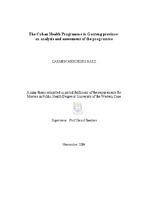The Cuban Health Programme in Gauteng province: an analysis and assessment of the programme
Abstract
Many parts of South Africa face a shortage of doctors within the public health system. While the PHC system is driven primarily by nursing staff, there is a need for doctors to provide certain services at primary and secondary levels. In 1996, as part of its efforts to address the shortage of doctors, the DoH began recruiting Cuban doctors to work in South Africa. This programme, now underway in eight of the nine provinces, falls under a government-to-government agreement aimed at strengthening the provision of health care in the areas of greatest need: townships and rural areas. The programme has demonstrated tangible success. However, it has also been criticised in some sections of the medical community and the media, where it has been portrayed in a controversial light. All this underlines the importance of an analysis of the programme, but to date, no such evaluation has been carried out.This research assesses the Cuban Health Programme in Gauteng province. On the basis of this thorough assessment, the government can take steps to improve the national programme, using Gauteng as a case study. This study was conducted in July 2004, employing qualitative methods to develop an in-depth understanding of recruitment and induction processes in Cuba and South Africa, the scope of practice of Cuban doctors, professional relationships, adaptation to the health system and broader society, and other factors. The researcher also conducted a review of official documents. Gauteng began with two Cuban doctors at the outset of the programme in 1996. The number peaked at 32, and has since dropped to 15. All of these doctors were interviewed in the course of the research, along with five managers and five peers. The study revealed that all the interviewees, except one manager, firmly believe that the programme has achieved its objectives, and should continue. Peers and managers commended the high quality, comprehensive and caring approach of the Cuban doctors, and say they are satisfying a real need. The Cuban doctors, however, believe that because they are providing mostly curative services, they are under-utilised. Flowing from the research are a series of recommendations. These include a proposal that the government recommit to the programme and ensure its continuity, and review the current role of the Cuban doctors, taking into consideration their willingness to provide training and expertise in preventive interventions.

